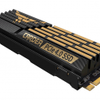Introduction
TeamGroup T-Force Cardea Z44Q 4TB M2 SSD (PCIe Gen 4.0)
Breaching 4 GB/sec M.2.Class SSD performance for a mainstream price
Teamgroup just announced the availability of their high-performance Z44Q M.2 NVMe SSD series based on QLC. Powered by a lightning-fast PS5016-E16 controller, this Cardea series product comes dangerously close to becoming one of the more storage-friendly SSDs we've tested in a long time. Of course, if you require lots of cold storage and performance levels above 5 GB/sec. Founded in Taiwan in 1982, Team Group is a well-known hardware manufacturer with a long history of meeting the needs of enthusiasts and gamers from all over the world. The company's product line comprises DRAM memory and solid-state drives, as well as memory cards and USB thumb drives of various sizes.
The Team Group Cardea Zero Z44Q SSD is up for review today, and based on the numbers "4" and "Q," you probably already have an idea of what this SSD is all about: PCI-Express 4.0 with QLC NAND flash. PCI-Express 4.0 provides twice the theoretical bandwidth of PCI-Express Gen 3, which may be able to compensate for some of the shortcomings of the slower QLC NAND. The Cardea Zero Z44Q is powered by a familiar Phison E16 controller used in the Sabrent Rocket Q4 and Corsair MP600 Core, among other products, as well. Such drives are all based on TLC NAND flash, however, the Z44Q is based on QLC NAND flash rather. The flash chips are Micron 96-layer QLC, which is pretty much the only QLC available on the market at this point in time. The mapping tables of the SSD are stored in 2 GB of memory, which is provided by two DDR4-2666 DRAM chips. The Cardea Zero Z44Q is available in two different storage capacities: 2 TB ($310) and 4 TB ($650). The endurance of these models has been set at 400 TBW and 800 TBW. The Cardea Zero Z44Q comes with a five-year warranty from Team Group, and unlike the Sabrent Rocket Q4, a heatsink is included at no additional cost with this model.
When we consider that the 4TB model costs 16 cents per GB, we're not looking at a cheap product; QLC should provide better value and capacity but comes at the expense of endurance and slower write performance. However, when you raise the amount of your volume storage size, your endurance numbers and performance increases along with it. Whether it is QLC or not, the specifications are impressive, but will this gadget deliver on its promises?


